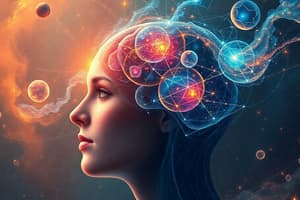Podcast
Questions and Answers
What do mental products refer to in the context of knowledge representations?
What do mental products refer to in the context of knowledge representations?
- The consequences of mental processes (correct)
- Mental constructs for encoding information
- The format of stored knowledge
- External representations outside the mind
Which type of representations serve as aids for cognitive processes?
Which type of representations serve as aids for cognitive processes?
- Imagistic representations
- External representations (correct)
- Mental images
- Internal representations
In the context of knowledge representations, what do internal representations refer to?
In the context of knowledge representations, what do internal representations refer to?
- Concepts and schemas
- Language-based symbols
- Mental constructs within the mind (correct)
- Physical objects
What characterizes external representations in terms of capturing information?
What characterizes external representations in terms of capturing information?
Which type of knowledge representation refers to the consequences of mental processes?
Which type of knowledge representation refers to the consequences of mental processes?
In a Mental Rotation Study by Shepard & Metzler, what was found when participants were asked to mentally rotate an object 180 degrees compared to 90 degrees?
In a Mental Rotation Study by Shepard & Metzler, what was found when participants were asked to mentally rotate an object 180 degrees compared to 90 degrees?
What did the Image Scaling study by Kosslyn (1975) suggest about verifying details in mental images?
What did the Image Scaling study by Kosslyn (1975) suggest about verifying details in mental images?
According to Dual-Code Theory by Paivio, how do concrete concepts differ from abstract concepts in terms of representation?
According to Dual-Code Theory by Paivio, how do concrete concepts differ from abstract concepts in terms of representation?
How did the Relational-Organizational Hypothesis by Bower explain the benefit of imagery on memory?
How did the Relational-Organizational Hypothesis by Bower explain the benefit of imagery on memory?
What was the main finding from the Paired Words Learning & Imagery study regarding word pair memorization?
What was the main finding from the Paired Words Learning & Imagery study regarding word pair memorization?
Flashcards are hidden until you start studying



